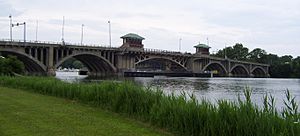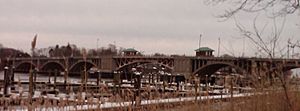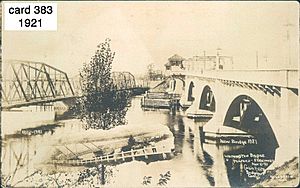Washington Bridge (Connecticut) facts for kids
Quick facts for kids Washington Bridge |
|
|---|---|

The Washington Bridge, as seen from the Stratford side of the Housatonic River
|
|
| Coordinates | 41°12′01″N 73°06′37″W / 41.20028°N 73.11028°W |
| Carries | 4 lanes of |
| Crosses | Housatonic River |
| Locale | Stratford and Milford (Connecticut) |
| Official name | Washington Bridge |
| Maintained by | Connecticut Department of Transportation |
| CT bridge number | 327 |
| Characteristics | |
| Design | steel trunnion-bearing movable (bascule bridge) |
| Total length | 859 feet (262 m) |
| Width | 43 feet (13 m) |
| Number of spans | 12 |
| History | |
| Opened | 1921 (reconstructed 1990) |
| Statistics | |
| Daily traffic | 23,300 |
| Toll | None |
|
Washington Bridge
|
|
| Location | US 1 at Housatonic R, Milford, Connecticut |
|---|---|
| Area | less than one acre |
| Built | 1921 |
| Architect | Connecticut Highway Department; Waddell & Son, et al. |
| Architectural style | Late 19th and 20th Century Revivals, open-spandrel concrete arch |
| NRHP reference No. | 04001093 |
| Added to NRHP | September 29, 2004 |
The Washington Bridge, also called the Devon Bridge, is an important bridge in Connecticut. It carries U.S. Route 1 over the Housatonic River. This bridge connects the city of Milford with the town of Stratford.
The Washington Bridge is special because of its design. It has five arches, each about 100 feet long. The state Department of Transportation calls it Bridge No. 327. It is also the longest drawbridge on the Boston Post Road. A drawbridge can open to let boats pass underneath. This bridge is a type called a steel trunnion-bearing bascule drawbridge.
The bridge is 859 feet long and 43 feet wide. It has two lanes for cars in each direction. There is also a sidewalk for people who want to walk across. The part of the bridge that opens for ships is 125 feet wide. When it was built in 1921, it cost $1.5 million. This made it the biggest and most expensive project for the state highway department at that time.
Contents
History of the Washington Bridge
Before the current Washington Bridge, there were two other bridges. These older bridges served the area from 1803 to 1894, and then from 1894 to 1921. You can see them in the old postcard image.
Early Crossings and Ferries
The first way to cross the river here was by a ferry. This ferry service started around May 1758. Some historians believe that George Washington might have used this ferry. He was traveling from Philadelphia to Cambridge, Massachusetts in 1775. He was going to take command of the Colonial Army during the American Revolution.
The First Bridges (1813-1921)
In 1803, a company proposed building the first bridge. They were first called the Milford and Stratford Bridge Company. Later that year, they changed their name to the Washington Bridge Company. The first permanent wooden bridge opened in 1813. People had to pay a toll to cross it.
This wooden bridge had to be rebuilt a few times. In 1807, ice flows carried the bridge out to sea. In 1868, a steamboat called the Monitor hit the bridge.
In 1844, Governor Roger Sherman Baldwin tried to stop a new law. This law would have made the Washington Bridge Company pay to change the bridge. The governor thought it was unfair because the reasons for the changes didn't exist when the bridge was first built. However, the Connecticut General Assembly passed the law anyway.
In 1845, the Supreme Court of the United States made a decision about this. They ruled that the law was not allowed by the U.S. Constitution. This case was called Washington Bridge Company v. Stewart.
The Second Bridge (1894-1921)
The second bridge opened in 1894. It was made of iron and cost $88,500. This bridge had two fixed sections, each 215 feet long. It also had a 200-foot swinging section in the middle. There was a walking path on the north side. A trolley line was added to the southern lane later on.
Building the Current Bridge (1921)
The current Washington Bridge was built in 1921. The company that made the parts was Bethlehem Steel. A famous engineer named John Alexander Low Waddell designed it. He designed over 1,000 structures in his career.
When it was first built, the bridge had two tracks for streetcars. It also had two lanes for cars. As mentioned before, it was the most expensive project for the Connecticut Department of Transportation at that time.
The Washington Bridge was added to the National Register of Historic Places in 2004. This means it is recognized as an important historical place.
Walking and Biking Across the Bridge
The Washington Bridge is the only place for people to walk or bike across the Housatonic River near Long Island Sound. The next bridge upriver is the Igor I. Sikorsky Memorial Bridge. That bridge is about 3.5 miles away.
It is against the rules to fish from the Washington Bridge.
Bridge Upgrades and Repairs
The Washington Bridge has been updated several times to keep it in good condition.
- 1935: The streetcar tracks were removed. This allowed the bridge to have four lanes for cars instead of two.
- 1990: The bridge got new pavement. Parts of its main structure, including the concrete walls and railings, were also repaired.
- 2007: A big overhaul costing $18.5 million took place. This included new fiberglass fenders to protect the bridge supports. A new generator and a modern control system were installed. The mechanical parts that help the bridge open and close were also completely fixed.
Bridge Safety Checks
Bridges are regularly checked for safety. Here are some results from an inspection in September 2010:
- Deck condition: Fair (5 out of 9)
- Superstructure condition: Fair (5 out of 9)
- Substructure condition: Fair (5 out of 9)
- Sufficiency rating: 55.4 (out of 100)
These ratings help engineers know what parts of the bridge might need attention.
Images for kids







